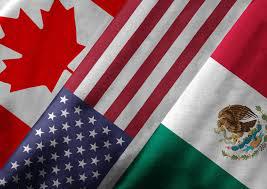Canada and Mexico eye retaliation as 25% tariffs come in
US tariffs of 25% are set to hit Canada and Mexico today, while those on Chinese goods have doubled, to 20%.
Despite some hope there would be a last-minute reprieve, Donald Trump said yesterday there was “no room left for Mexico or for Canada” to avoid tariffs.
“They’re all set. They go into effect tomorrow,” he said. The tariffs will affect more than $918bn-worth of US imports from Canada and Mexico.
The stock market plunged after the announcement, with the S&P 500 falling nearly 1.8% in its worst day since December.
And all three countries look set to retaliate.
China will next week impose tariffs of 10% or 15% on a mix of imported US agricultural products, including meats, fruit, vegetables, and dairy.
Canada said it would immediately impose 25% tariffs on more than $20bn-worth of US imports, with a further $86bn-worth of goods being hit by tariffs in 21 days. Prime minster Justin Trudeau has previously mentioned goods such as bourbon, beer, wine, Florida orange juice, and home appliances.
Mexico is yet to respond, but said it had “a contingency plan”.
Mr Trump also warned of coming tariffs on imported produce, telling farmers, in a social media post, to get ready to sell their goods domestically.
“To the great farmers of the United States: Get ready to start making a lot of agricultural product to be sold INSIDE of the United States. Tariffs will go on external product on 2 April. Have fun!”
The US president also took time last week to suggest that the EU could face a similar 25% tariff on its US-destined exports.
Having claimed the EU had been “screwing the US for years”, Mr Trump said he and his cabinet had “made a decision… and it’ll be 25%, generally speaking”.
However experts from many fields have, in contradiction to the noise from the White House, predicted it would be US consumers that suffer the most from the tariffs, especially those applied to Canada and Mexico.
Columbia Business School professor Brett House said the union between Canada, Mexico, and the US made “North America an incredibly competitive place to build automobiles”.
“You can tap relatively cheap steel and aluminium from Canada, use the relatively low-cost labour in Mexico to assemble cars, and you can leverage the hi-tech expertise and technology of the US together,” he told Time magazine.
Without access to these neighbouring resources, US consumers could see car prices increase by $3,000, with pick-up trucks facing a $10,000 hike.
Such is the threat of looming price increases that Rice University Baker Institute for Public Policy fellow David Gantz added that, with taxes applied each time goods crossed the border, the move would create “an administrative and bureaucratic nightmare”.
Martin Balaam, CEO and co-founder of product information management platform Pimberly, warned that those not importing finished products could struggle, with the impact “being felt much further down the supply chain now”.
He added: “It could be that the impact is hitting them two or three suppliers down the supply chain.”

